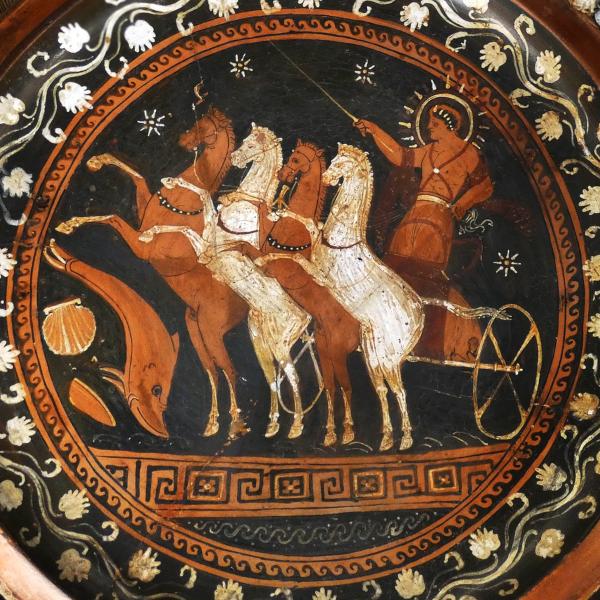There are many traditions that are unique to Greece, and one of the most well-known is the tradition of breaking plates. But why do Greeks break plates? There is no one answer to this question, as there are a number of theoretical reasons that this tradition exists. In this blog post, we will explore some of the possible explanations for why Greeks break plates…
“Smashing plates” has been used to signal the end of one thing, and the beginning another; to ward off evil spirits; and to express abundance.
In a symbolic ritual, a plate is smashed at the graveside of the departed following a Greek Orthodox funeral. Life has ended on Earth. The plate is smashed, signifying the end of life.
Another possible explanation is that breaking plates is a way to release negative energy. In many cases, breaking plates is seen as a way to vent anger and frustration in a relatively safe and controlled manner.
The Symbolism of Breaking Plates in Greece
This tradition can also be seen as a way to show strength and resilience in the face of difficulty. By breaking plates, Greeks are showing that they are not afraid to face challenges and that they are ready to move on from the past.
When a plate is broken, it is considered to be dead. But when it is put back together, it becomes whole again. This symbolism represents the idea that Greeks see every challenge as an opportunity for growth and transformation. It symbolizes rebirth and new beginnings.
A plate was also a synonym of abundance, therefore smashing a plate was a bit like lighting a fire with banknotes.
There are many other interpretations as to why Greeks break plates during celebrations, but these are some of the most common ones. Whether you agree with them or not, there is no doubt that this tradition is an important part of Greek culture.

If you’re curious to see this tradition in action, be sure to check out one of Greece’s famous plate-breaking festivals! You’ll definitely see some plates getting broken during these festive events!
The Breaking Dishes Today in Greece
Nowadays, however, breaking plates is considered a dangerous practice due to the flying fragments, but also because of inebriated tourists who can have bad aim and hit dancers or musicians.
In the 1960s the custom of breaking plates in Greece reached its peak: it had become an absolutely normal occurrence, extended to any type of celebration, not just weddings.
In 1969, the current dictatorship in the nation banned this tradition, proposing its implementation through gypsum plates, specially produced for the same purposes and less sharp than broken ceramic and porcelain.
Once the dictator fell, some Greeks perpetuated in carrying on the tradition, while others agreed to overcome the past by substituting throwing flowers for destroying dishes.
The custom is today discouraged in Greece, so much so that a license is currently required for establishments that want to offer this experience.
However, be aware that if you are offered dishes to break during dances or other performances, these dishes are usually not free and will be charged at the end of the evening, usually one or two euros per dish. That’s in addition to your fabulous Mediterranean meal, obviously.
Perhaps the best choice is to clap or shout “Oopah!”
Modern Greeks tend to stray away from this habit, which has instead remained a folkloric custom for tourists. Nobody breaks plates anymore as a sign of kefi.
Kefi (κεφι) is a word well-known to Greeks and extended friends of a Greek family. It’s a difficult word to define because it’s more of a “feeling.” But it is given a name so that we can speak about it and relate to someone else’s experience.
So What Is “Kefi?”
On the surface, when a Greek mentions the word kefi, they are referring to a loosely defined joy, spirit, passion, happiness, triumph, excitement, fun, or just the love of life. It is a release. When there is so much joy and spirit that it’s overwhelming, and needs to come out. Then when it does, we are reminded of the beauty of feeling alive.
It’s important to note that kefi is not exclusive to celebration. It is a positive feeling incorporated into daily life. Kefi asks us to tap into our spirit, our appetite for life, and create bliss and excitement in everything that we do.
It is about living in the moment and having gratitude. Connecting with fellow humans in a way much more profound than words. It’s dancing when the music begins to play, when it rains, even when nobody else is around.
Many prefer to throw flowers instead. In bouzoukia (discos) or other modern venues, waiters go around the tables selling flowers to customers, who throw them towards the singers during the performance.
Why Do Greeks Break Plates?
Documentaries, films and memories contribute to spreading the myth of breaking plates during Greek events or weddings. Little is usually known about the origins of this millenary custom and why it spread both on the mainland and on the Greek islands.
In ancient times, the spouses used to break the plates in front of the door of the house as a sign of good luck while the wedding guests shouted the classic “Oopah!” The custom was a good omen and was a symbol of abundance: “We have so many dishes that we can even break them!”

Breaking Dishes in Greece – Not Only Weddings
In its ancient form, it is possible that the custom of breaking plates in Greece derives from the idea of destroying the ceramic crockery used for the feast of the commemoration of the dead.
The voluntary breaking of plates, which represents a kind of controlled loss, helped the funeral participants to struggle with the pain of losing their loved ones, which is a type of loss completely beyond their control.
The custom was therefore a help for those who had suffered the loss of a loved one and invited them to express their pain with this liberating gesture.
But there are further traditions that could be pointed to as possible origins of this custom.
Broken Glass Greece
The potters at the origin of the myth
In ancient Greece there were numerous potters who traveled from village to village in search of places where clay was abundant. What if the potters themselves were the origin of the myth?
One explanation could be that the origin of the myth of the breaking of plates in Greece were precisely the potters who used to break pottery, creating a myth that could have performed the same function that marketing does today. In other words, creating a greater need for their products! Brilliant!
The Breaking of Plates in Artistic Performances in Greece
In some musical shows, usually singers of love songs, the same custom of breaking plates has spread. In this case, however, it is the singer himself who breaks the plate on his head while he sings, as if to translate the loving pain into physical pain.
In Greece, breaking plates during a singer or dancer performance became part of the kefi. The kefi in this context is a feeling belonging to Greek culture that would then be expressed in the conscious breaking of the ceramic as an unbridgeable reaction of joy or enthusiasm for the show that has just been witnessed.
But where does the Greek custom of breaking plates come from? In ancient times, and up to the Middle Ages, it is said that having a dish divided into many pieces was a ritual in place on occasions of mourning, as a symbolic action to “kill” one’s pain and find courage in facing loss.
But this theory is not so certain: there is in fact another one (which, however, could have simply been coexistent, but could also have changed over the centuries) which mentions breaking dishes as a custom practiced by the wealthiest, as a display of one’s wealth.
It is said that at the end of medieval banquets not only dishes, but everything on the banquet tables could literally be destroyed by the host and authorized guests.
According to the beliefs still in force today, if the dishes are broken at a wedding it is to symbolize the breaking of bridges with the past by the new spouses, and therefore represent a good omen for a new beginning.
At the same time, according to the most ancient tradition, breaking the dishes would chase away evil spirits, even from the parties themselves, so this represents a ritual so that they are never ruined and guarantee the guests the most genuine fun, the kefi.
Have you ever been to Greece? What did you think of this unique tradition?
